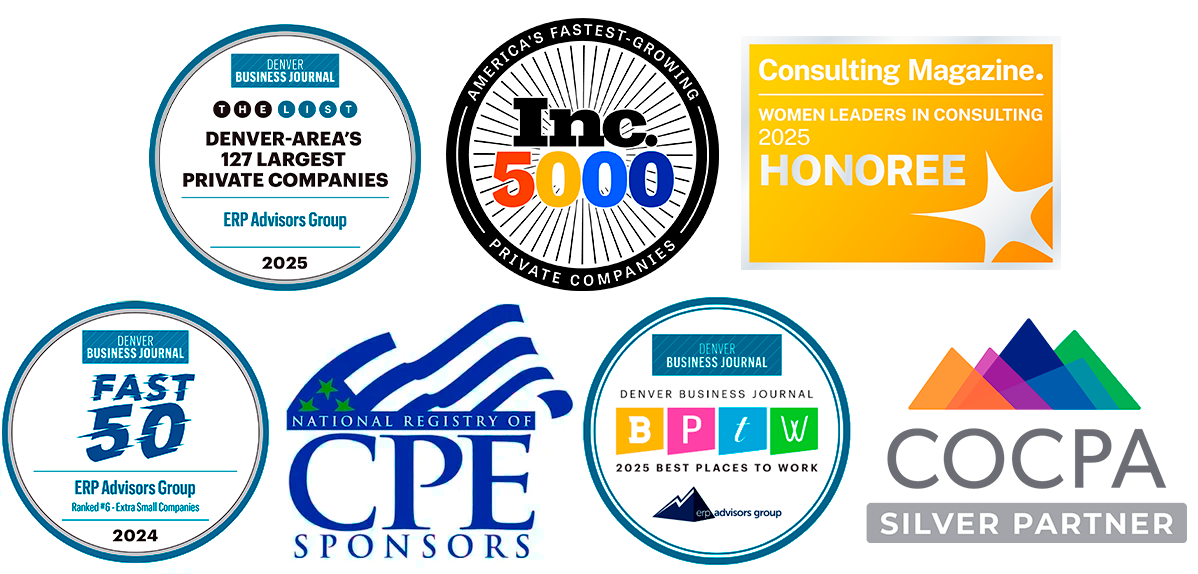ERP software implementations aren’t naturally destined for failure. The key lies in finding someone who can orchestrate the thousands of details that are intrinsic to a successful ERP implementations — and then harmonize them into the final result of a successful go-live.
This episode of The ERP Advisor features Joseph Malil as a special guest. Joe has a 20-year background in Information Technology, with experience with multiple ERP systems, including SAP, Infor, Epicor, Microsoft Dynamics 365, and Oracle NetSuite. His skill in managing projects has led to many successful ERP implementations.

When a company is considering a software update, they may decide to end the process before they have even begun. While the problems and mysteries of an ERP project may seem indecipherable, we have identified the most reliable and effective steps for ERP implementation success.
In this guide, you’ll find:
- Every phase of an ERP implementation plan
- How to set realistic goals for your project
- What ERP implementation pitfalls can arise
- How to overcome an ERP system failure
This guide will provide the answers — but first, we will examine some of the most common mysteries of ERP implementation.
1. Not Knowing the Process
The first major mystery of an ERP implementation is not having accurate data on where to begin and how to manage the process. But by following our guide, you can understand every step in an ERP implementation project and know exactly what to do and when. Having just a little bit of knowledge can make a large project less daunting.
2. Not Knowing the Time It Will Take
Time is a crucial factor when planning for an ERP project. How much time will it take to train employees on the new system and processes? How long from step one until deployment? Inaccurately estimating the amount of time of a particular step in the process can cause a ripple effect until you are going over budget or not going live on time. Creating an ERP implementation plan will help you understand what steps are needed and how much time is required for each one.
3. Not Knowing How to Work with Vendors
Finding the right software and implementation partner is only half the battle, you also need to understand how to work with ERP system implementation vendors. Most important is communication. Never assume that a vendor knows every feature you need just because you have given them an overall view of the departments that will be using the new products. Also, it is vital that you find out from the very beginning of a project which parts of the implementation process will be handled by your vendor and which ones will be handled by your team. Many ERP implementation failures stem from assuming that a vendor is going to handle more of the process than they actually do.
4. Not Knowing the Realities
Once you have a product and vendor selected, and have written a thorough implementation plan, it is easy to think that everything will run smoothly from that point. But to have a successful go-live, it’s important to set realistic expectations for your team and for your implementation partner. Remember that nearly every part of an ERP project can go beyond an initial estimate, including the budget and timeframes of each phase. Thinking realistically and planning for contingencies will help keep a project from getting into trouble.
Following our guide will help you to solve the ERP implementation mystery and alleviate any fears you have about the process. In it, you will learn what the key components are for an implementation, which will enable you to look realistically at your company’s time and resources for the project. You may then decide to take on the project yourself, or that it is more practical to get help.
Narrator: This is The ERP Advisor.
Today's episode: Using an ERP Consultant for a Successful Implementation.
Juliette Welch: Good afternoon everyone. Thank you for joining us for today's call: Using an ERP Consultant for a Successful Implementation. Shawn Windle is one of our speakers for today. Shawn is the Founder and Managing Principal of ERP Advisors Group based in Denver, Colorado. Shawn has over 20 years of experience in the enterprise software industry.
Joe Malil is our guest today. Joe is a Principal Consultant at ERP Advisors Group. He has over 20 years’ experience with information technology and has helped many organizations with analysis, selection, and implementation of their ERP systems with a proven track record of successful projects.
On today's call we will discuss ERP implementations and all the intrinsic details involved. We will also take a look behind the scenes to reveal the mechanics of how our consultants work their magic to accomplish successful ERP implementations.
Shawn and Joe, thank you for joining us.
Shawn Windle: Good to see you, hello.
Joe Malil: Good to see you.
Juliette: Implementations — one word that means a lot and has a lot of moving parts with the ultimate goal being a successful go-live.
But as you both know well, it takes a lot to get there, right? A lot involved, yes. So, and a lot of expense and investment and everything, right?
Shawn: That’s right.
Juliette: Okay, so we'll jump right in, Shawn. I'm going to start with you with a two-part question.
How do you know whether or not you should hire an ERP implementation consultant and if so, how do you go about finding the right one?
Shawn: Okay, perfect.
Juliette: That’s easy.
Shawn: We can answer it like salesy blah blah blah blah blah. But we don't do that. We’re pretty honest.
So, the first part of the question — I'll answer that then I might ask you to repeat the second part — but my attention’s on the first part.
We're not for everybody. And that's really true. So, if a company is going through a major software change like CRM, HCM, ERP, E-I-E-I-O, all those different acronyms — sorry, I'm excited to have Joe here today, because he's the funny guy; we're going to have some fun. But if you look at all those different kinds of enterprise applications, there's complexity and there's lots of challenges that goes with each one that's a little bit different for each department that's impacted and all that stuff.
But when it comes to the implementation, some organizations — companies, nonprofits, government agencies — have enough people and enough time with those people and enough experience and time of those people to get through it. So, there are good projects that happen without implementation consultants.
But when you look at the client-side — that's what we're talking about, we're not talking about the technical. I should make a disclaimer here. If you go out and acquire an app, don't think your internal team is going to be able to set it up. That's impossible unless your internal team happens to have that very specific experience on the app that you selected, you're going to need specialists that only do that. So, I will separate the technical configuration from what we call client-side implementation services. So, I'm going to answer your question from when you need client-side implementation services.
Juliette: Okay, sounds good.
Shawn: Like I said, if you have people who have time and experience implementing projects, you're probably going to be okay. But what I've noticed in my long career — I got a haircut recently and I think they cut off most of my grays, I think they're just shorter now.
Juliette: It's wise experience. That's what it is, yes.
Shawn: It's wise experience that’s right.
Since 1999 — there was a tech boom in the late 90s and then there was a tech bust going into the early 2000s and you saw a lot of growth and lots of organizations had tons of people. But I will tell you in the last 20 years that is not what we see, especially with midsize organizations. People are really busy already.
Juliette: Right, they have their own job.
Shawn: They have their own job. They're usually working during the day and a little bit at night and a little bit in the weekends already. You know 40, 50, 60 hours sometimes. And the really good people are definitely doing that. And the good people are who you need on the implementation.
So now you've got your good people and you're going to give them this other project and you're going to expect them to pay attention to all the details of both projects. And it's a bit of a disaster ready to happen.
So that's one of the biggest indicators we look for. Even if we're like, should we help these guys? Can we help them? Are they so busy with their day jobs that they really do need an expert that can come in and help kind of offset and do some of the tasks on the client-side? So that's how I'd answer the first question is it depends on how many resources you have available and their experience with doing it.
What was the second part?
Juliette: How do you go about finding the right ERP implementation consultant?
Shawn: Okay, now that's a really good question, too, because there's lots of options in the market. Again, I'm like the worst salesperson ever. There really are. Like you could go out and hire a gal that's a project management professional, PMP. You could go out and hire somebody who's implemented a project on their own. You could go out and hire your accounting firm to help you, or you could go out and hire an outsourced accounting resourcing company to help you. Or you could hire a firm like us.
There's six options I just laid out. There's probably more — you could go hire somebody and then bring them in full time to run your project. So, there's lots of different options, but what it ultimately comes down to, what I look for on every client that we're vetting — when clients vet us, we vet our prospects.
One of the biggest things I look for is do they have the need to get the project done right, they need to get it done fast with the ultimate quality and they value that. If they really need to do that like they really need a professional job — maybe the difference between calling one plumber over another —they're all the same. No, they're not. They really aren't.
We're on the more high-end, maybe a little more expensive, but it's sort of like a really nice hotel room. I travel, I used to travel a lot. We're starting to get back on the road, but I tend towards hotel rooms that are maybe a little bit more because they're a little more clean. They're a little more friendly — the staff. And that's sort of how we are. We know what we're doing, we're going to come in, we're going to kill it, we're going to do amazing. It's inevitable, because that's just what we do for a living.
But sometimes you don't need that kind of firepower is what I'm trying to say. We just had a client that I was thinking about for Joe that was related to similar to a client that you had just done an implementation with. So, we'll talk about that more where one of the clients hired us, Joe ran a really successful NetSuite implementation, then we had another client we helped with the selection that actually went with NetSuite — different client — and then they hired somebody to do their client-side project management, not us. And so, there's two different scenarios there, but the difference between the two is that the first company was moving fast. It was a very complex implementation. And they also — when the project was done, they kind of just needed the person to go away. I mean, what are you going to do if you hire somebody and then the projects done?
So, those are just some considerations I'd throw out.
Juliette: Well, sometimes your time is worth more to continue working and doing what you need to do and then bring someone in to help you.
Shawn: That’s it.
Juliette: So, Joe, we're so happy to have you join us. Thank you.
Joe: Oh, glad to be here. Thank you.
Juliette: So, I have heard through the grapevine that we've had some really amazing go-lives recently. Can you share with us your work with them and how they got to where they are today with your help?
Joe: Sure, absolutely.
So, one of the clients is based out of Troy, Michigan, and they basically run a bunch of consultants that help them with various decisions and help advise them. So that was really good.
The only differentiating factor with that — every go live is different; you have different clients, you have different vendors, so the key thing is to find a very good vendor. In this case it happened to be an offshore vendor and the most important piece became the communication aspect, as far as from the offshore to our team and from our team to the offshore team. So, the communication aspect was extremely important. This client also did not have a lot of experience with ERP systems; hence, they came to us as advisors to walk them through it.
So, the first thing we did was figure out what they need. How do you want to go about doing this? And we lay out a plan that we’d like them to follow. And we have to hold their hands through it all because they did not have anybody on their team that actually went through an ERP implementation, so they did not know the ups and downs of what an implementation could entail — a lot of hidden dangers and a lot of hidden gems depending on if you know where to look for it.
That's where an experienced ERP advisor comes in. So, the project went very smoothly. There were a few hiccups here and there, as expected with almost every implementation, and it's how you navigate about those and how you identify those ahead of time so you can mitigate those risks that come up. So, all in all, that project went quite well. Quite flawlessly actually.
The other client had offices all around the world, so it was a little bit trickier in that we had to coordinate between the various countries and the corporate office here in the US. So, the difference in this particular project was they had a resource internally that was quite technically savvy, so that resource was able to step in and do some of the configuration work, et cetera. As long as they were given the right guidance. It helped as far as sharing knowledge where the consultants no longer have to teach and train this particular client because they have an internal resource — a lot of times that's not the case, so we have to step in and be that technical expertise for them.
We have to manage the vendor and it's extremely important to have the right vendor. You don't want someone coming in that's only done one or two implementations. You want someone that's quite seasoned and has been there before, has seen the ins and outs of everything imaginable that can go right and wrong within an implementation.
And I like using analogies because I'm Mr. Analogy. It's like if I wanted to go on a guided tour of the Amazon Forest, I don't want to go with someone who's just looked at a Google map and read up on it and know how to go through it, but I'd rather go with someone who's been through that a few times on the floor — watch out for that area. There are sand pits over there. This is where in the afternoons the lions like to hang out. So, you want to navigate through those and go through the safest route possible and identify issues way before they even occur. The only way to do that is through experience.
Juliette: Without a doubt. So, referring back to client-side implementations, what can you tell us, Shawn, about client-side project managers and how they can help achieve a successful go-live?
Shawn: Well, a client-side project manager — the best that I've seen — they basically kind of represent or look like or resemble a bulldog.
That's really it. Like Joe. So, when you see Joe, he's a great guy, he's super nice until —
Joe: Get me in front of a project.
Shawn: That's right. We've had a couple situations recently with one particular vendor in the nonprofit space that's just been kind of dragging their heels and everything else. And so, Joe's been able to stay on these people and make sure that they show up and they get things done.
Another construction company we're working with right now that's trying to optimize their existing app — and that implementation partner has been just a booger to work with, so you just chase them up; you just stay on people. Make sure that things happen — like for real happen. And I think that's the thing that I love the most about our team is that we're not jerks about it like “hey, where is it? Let's go, chop chop.” It's like “hey what's happening? Why? Why are you delaying? What are you waiting for? What more information do you need? Is there some problem that's preventing you from giving us what we need? And inevitably the implementation team will say, “Well, yeah, we need blah. We need this requirement. We sent the note to the client. They haven't got back to us.” And literally on calls we'll say, “Okay, hold on” and we'll join the client into that call like bridge them in or zoom in or whatever we do. And then loop, there's the person we talked and it's done. And the implementation partner has what they need to get it done right.
So, it's really. It really does come down to somebody who is willing to get cycles done. It's really a funny thing, like I've observed a lot over the last years and working in lots of different organizations, big companies, little companies, whatever, but what I really love about — again, our client-side project managers is they're like okay, this is the task. I get it done. What's the next task? I get it done. Oh, this task goes a little longer. Fine, I go on to the next one. I get that done. I go back to them and get it done. It's done. We want “dones” and that's what you really need from that PM is just things getting done. Not just “well, here's the plan and here's the issues list and spread little magic here and there and everything is fine.” No, what did you do? That’s what we look for.
Juliette: Okay, so it sounds like organization and communication.
Joe: Absolutely.
Juliette: I think that's with everything.
Shawn: Yeah, but when you're paid to come in and pull this stuff off that's a really big success criteria I look for is what did you get done? How many meetings did we hold this week? How many deliverables did we deliverable deliver where there was satisfaction with the client?
Juliette: So, Joe, let's say someone starts out thinking they can do the implementation by themselves, but then they realize they need to bring some someone in to help. How can an ERP consultant help rescue an overworked team?
Joe: All right, good question. A lot of the time, people and individuals think that they can handle the implementation on their own or within their own company and their own team. It doesn't take long before they get into the path that they realize that they’re way in over their head. There are so many loose ends that need to be tied up. There's so much knowledge that we don't have internally that is required to run this project.
So, that's when they come to a company like ours and we jump in. The first thing that we do is analyze everything that's going on. Analyze what needs to be implemented, what the skill sets are within the team, and try to formulate a plan that works through every single aspect of the of the project as far as what kind of training is required? How skilled are the vendors? What kind of time is available from the client-side to actually implement the project? Most of the time it's going to be another job that you have in addition to your regular job. It's at least 50% plus. Depending on which phase of the project you are in, could be 100% it could be 10%, but they need to have the visibility into what is required from a resource perspective.
Then, we come in and then we start driving the project and driving the project could be one of many things, it could be guiding them, it could also be rolling up your sleeves and jumping into the system which I've done a couple of times. I get access to the system, I get in there and start looking around and trying to figure out what needs to happen, so it just depends on what really needs to happen.
A lot of times tasks need to happen. The key thing is to figure out why it’s not happening. That may be lack of training. Is it not knowing what the future holds? So once again you sit down with them and say alright, how can I help you? And we sit down with the client, and we work as a team to accomplish that particular task. And as the project goes on, you start getting the confidence of the client. They start trusting you more and more because now you are actually helping them on this complex journey.
Shawn: Juliette, if I may, it reminds me of a client that we're working on very recently. The question is very apropros. And this particular client was going through an implementation for a couple years or so and then called us. And then you went in and what did you do for those guys?
Joe: Yeah, I went in and I did an analysis of where they were at. They were thinking about going-live in a couple of months — they were nowhere close to going-live.
Juliette: Oh geez, oh gosh.
Joe: They were still configuring the system, requirements were out there that they didn't know about, they had no idea how to go about doing the testing scenarios and walking through the whole testing phase of it, they hadn't even begun on that journey, they couldn't get an agreement as far as how their own processes run — different people had different ideas of how things were run. So, it’s like okay, let's go back to the drawing board. Let's start from square one. Let's do this the right way and advance in that manner. We're still in that project, and we expect to be in that project for a little bit longer.
Juliette: Yeah, well, thank goodness they found you, because it would have been a disaster otherwise.
So, Shawn we're going to get a little technical here. There are many different ways to approach an ERP implementation. What would you say that the big bang approach — is that better than a phased approach, or what can you share with us on that?
Shawn: Yeah, that's a great question. I have a little bit of a thing to give up as I know we kind of look at the questions in advance. I look at them extremely fast just to make sure they're fine and then I don't even think about them. So, when you ask these questions, I'm like wow, what do I say this? I don't know.
I mean, they're both good. No, here's my instant answer — I'm at the point in my career where I know the right answer, thankfully.
The right answer is phased approach unequivocally, every single time, if you can. There's a reality there that — take a construction business for instance. We're doing a lot of construction work right now, which is great. Just talked to a great company this morning, too.
I'm just going to use this as an example, but this is so — we've talked about this before. Go to the website, there's tons of information about how to decompose the business processes, understand the business application ecosystem and the different functions that are within there, and you've got the diagram with the puzzle box. I think if you search on puzzle box ERP, we should have something that comes up. Right, Shaun?
Juliette: Yes.
Shawn: Sorry, our awesome Digital Marketing Manager is writing it down. Thank you, Shaun. Thanks for everything as usual.
Anyway, so, here's the thing is that the more change you have, the more risk you have to the organization dying. Like I don't care what kind of change it is, and I mean literally dying unfortunately. It could be a new manufacturing machine, it could be a new way of doing a certain service, it could be a new market. Whatever it is, the more change, the more risk there is, so anytime you can limit the amount of change to a segment and then make that segment bigger later and then bigger later and bigger later, the better you are because the first phase you get a certain benefit that will be realized across all the additional phases.
So, I mentioned the construction business. So, for this particular client, just thinking with them. They have kind of a best of breed approach for their apps and they’re looking at changing out their ERP — what they're really looking for is finance and job costs. Those are some of the biggest areas that they need to focus on — some sales stuff, too. But they have their time tracking in a system they're implementing in HR, and so there's other things, too. But if we can do a project for them where we can get them into their new app quickly and get the key users that are involved in that first phase comfortable, that's great, but what's really beneficial is the IT people, the executives, the stakeholders across the whole organization see that we can do it successfully and then they know what to do better on the second phase.
So, another example is a larger client of ours. It's a wholesale distributor. It's coming off a very large mainframe system and then they have other best of breed apps bolted in around it. And what we've realized for them — and this is really important — as you know, I try to drop in nuggets that's like, please, get this point for folks that are listening to this — they're on a very old legacy technology, and so to move over to a cloud-based software as a service, multi-tenant — I'm aging myself when I say wisdom — but open SOAP APIs and all the stuff that's like whizbang new today, to go from the old to the new with just a little bit of the business helps us get used to the new technology platform and there's so much to be said for that.
Just having the knowledge of how that platform works and getting all those learning lessons learned out of the way so that then the next phase is really just about going from finance in the first phase to going to go to purchasing and the second phase. That doesn't sound like you would do it, but in this instance, they purchased billions and billions of dollars of items every year. So, it's a big deal.
Now at least, we're just dealing with the purchasing process. We're not dealing with “oh my gosh, I need to write a database trigger, and I can't because the instance is shared amongst multiple companies.” What are you talking about? I don't even know what you're doing. No, but you will. You will by the second phase you'll know how that technology platform works, so then you're just focused on the different parts of the business that you're rolling out the software to, as opposed to all the rest of the concerns as well as usually, you have executives looking down at you saying “you know these projects don't usually go so well, so how's yours going to be different there, Mr. or Mrs. sponsor?” So, get a quick win. That's what it comes down to. Sometimes you can't do that though. Sometimes it's all mired together, like this client that Joe is talking about — all its custom systems and everything else and the whole purpose of their project is to have a new platform to run the business from. Everybody’s got to go at once in that instance.
Juliette: Right, it's just a matter of how you get there and finally getting there, right?
Shawn: Yes, absolutely.
Juliette: Well, I think we're out of time for today so we're so happy everyone joined us. Joe, Shawn, thank you for always sharing your expertise with us. We appreciate it and we're going to continue this next month on our webinar series talking about successful go-lives, so this will just roll into next month for us. So, Joe, maybe you can come back and join us again?
Joe: Sure, absolutely.
Juliette: Yeah, that'd be great. So okay, perfect.
Narrator: ERP Advisors Group is one of the country's top independent enterprise software consulting firms. Advising mid to large sized businesses on selecting and implementing business applications including ERP, CRM, HCM, business intelligence, and other enterprise applications which equate to millions of dollars in software deals each year across many industries.
This has been The ERP Advisor.





